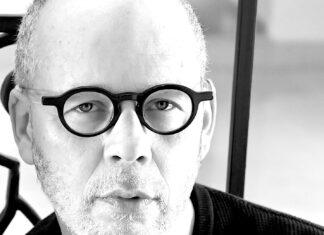Pascal Rambert torna in Italia per un progetto triennale al Piccolo Teatro di Milano. La prima parte di questa trilogia, Prima, parla di una compagnia intenta a rappresentare uno spettacolo a partire dalla Battaglia di San Romano, capolavoro quattrocentesco di Paolo Uccello. Intervista.
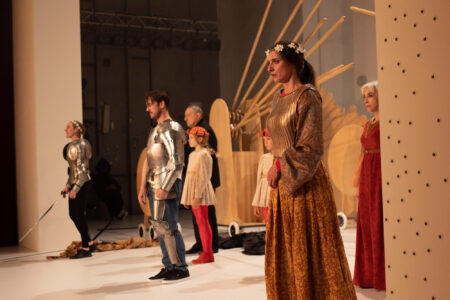
Raggiungo telefonicamente Pascal Rambert il giorno della prima di Prima al Piccolo di Milano, mentre penso che questo bisticcio di parole è un accavallamento che ha molto del teatro del regista e drammaturgo francese. Sempre au bord de la vie, sempre come sul punto di cadere dalla scena e invadere la platea, poi da lì il mondo attraverso la coscienza dello spettatore. Rambert ha una voce riposata e giovanile e quando gli chiedo come sta, pensando alla naturale tensione prima di un debutto, mi sorprende rispondendo “stavo lavorando al testo di un nuovo spettacolo che debutterà Al Cairo, al Festival D-Caf, il prossimo ottobre”. È come se in poche parole si affastellassero tutte quelle che seguono e si facesse subito largo la percezione di parlare con un artista per cui il teatro si rispecchia nella vastità del mondo e viceversa, producendo una lingua netta, luminosa e al contempo misteriosa come l’intrico prospettico della lance nella Battaglia di San Romano, il trittico quattrocentesco cui si ispira lo spettacolo milanese.
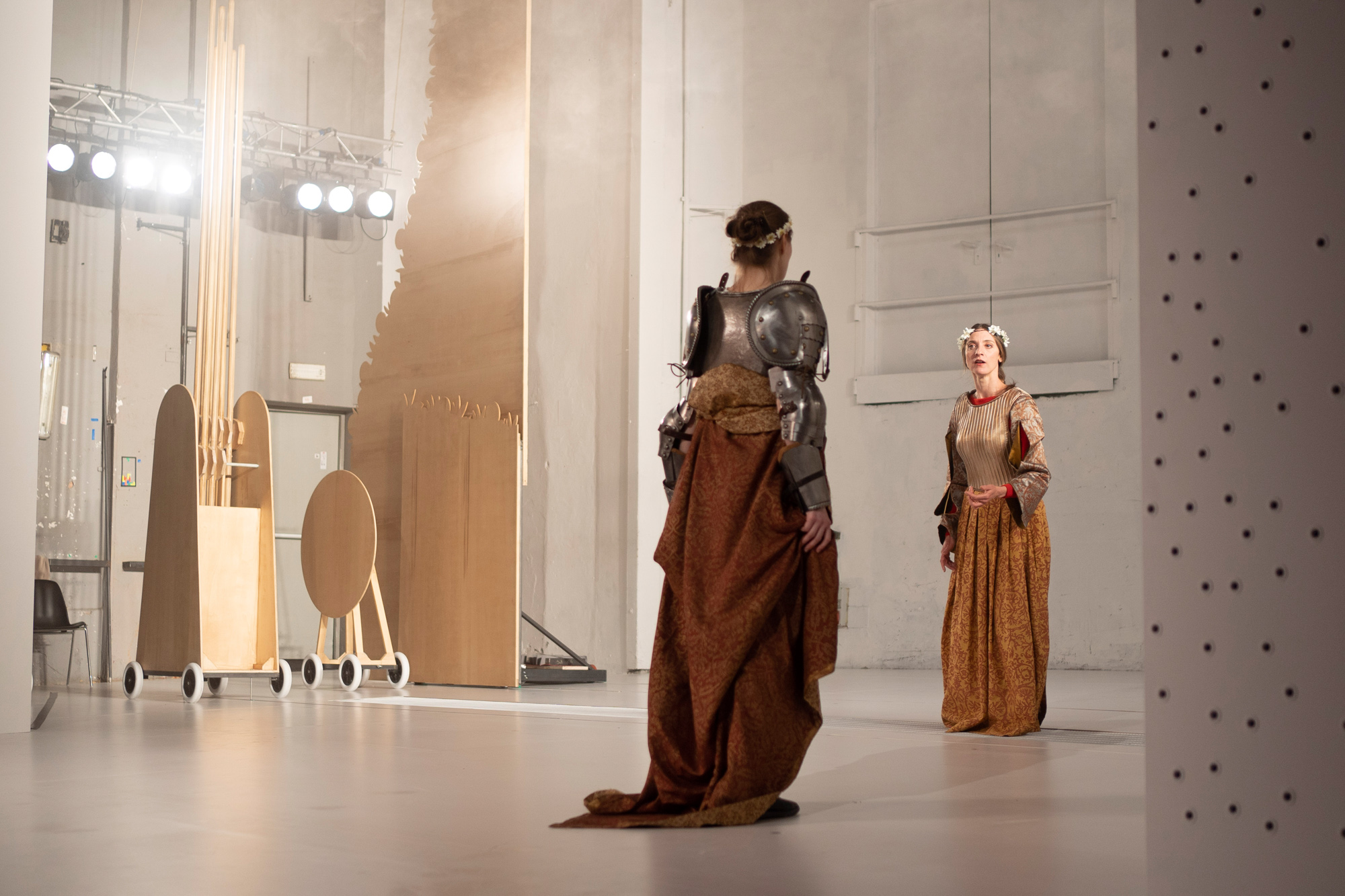
Rambert cita molti nomi di persone nel nostro scambio, spesso ripete anche il mio nome, appena appreso, come per scavare più a fondo nel mio ascolto. Si sofferma con particolare riconoscenza su Pietro Valenti, che lo invitò in Italia nel 2014 con Clôture de l’amour, spettacolo che inaugura un rapporto speciale con Anna Della Rosa. “Per me è particolarmente importante ricordare quelle persone che per prime ci hanno invitato a lavorare in un Paese”. Le sue parole si dispiegano chiaramente lungo due assialità contrastanti: una, centrifuga, di geografie remote, da Mosca a New York, da Pechino a Ouagadougou; una, centripeta, la fedeltà alle parole, ad attori e attrici. “Cerco di non cambiare mai partner produttivi”, e anche con Claudio Longhi l’idea di questa trilogia si è ben sedimentata, dal primo contatto nel 2020.
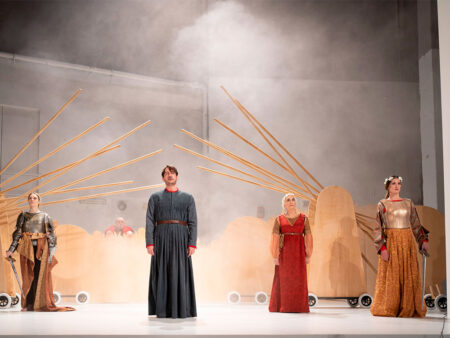
Perché La Battaglia di San Romano? Perché la pittura?
Anche in 3 annonciations, presentato in Italia alla Triennale di Milano nel 2021 con in scena, tra le altre, l’amica Silvia Costa, partivo dalla pittura. In quel caso la domanda che lega la profondità del tema iconografico, l’annunciazione appunto, con il nostro tempo è: cosa può essere annunciato oggi? Come possiamo scrivere o riscrivere, nel 2023, a partire da un tema così importante nella storia dell’arte e dunque nella nostra cultura visiva? Per questa trilogia al Piccolo Teatro di Milano c’è stato un cortocircuito tra la mia folgorazione per La battaglia di San Romano, la sua natura di trittico, e la proposta di Claudio Longhi di articolare un lavoro che coprisse tre annualità con tre spettacoli: dopo aver ascoltato la richiesta, per me è stato subito chiaro che il riferimento dovesse essere quello. Così ho passato diversi giorni a osservare la tavola fiorentina del Trittico, il Disarcionamento di Bernardino della Carda, e a leggere testi a riguardo (le tre tavole del dipinto sono oggi divise e conservate alla Galleria degli Uffizi di Firenze, alla National Gallery di Londra e al Musée du Louvre di Parigi, ndr).
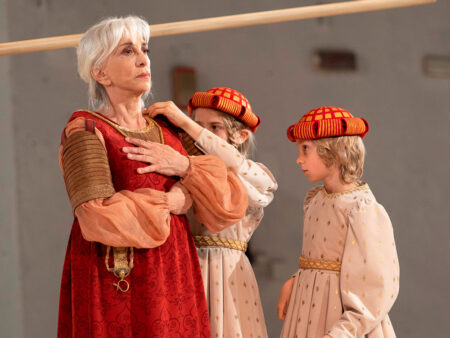
Ma non sono uno storico dell’arte, quindi le informazioni che ho appreso, in qualche modo, le ho subito dimenticate quando ho iniziato a scrivere. Prima però è venuto l’incontro con gli attori: non inizio mai davvero a scrivere prima di averli incontrati, chiedo sempre alla produzione di poter fare i provini tempo prima di mettere mano al lavoro. In questo caso abbiamo formato il cast più di un anno fa, a gennaio 2022. È andata così: il primo giorno di casting ho capito che non potevo non lavorare con Anna Bonaiuto, il giorno dopo ho avuto la stessa sensazione con Marco Foschi. Subito dopo ho realizzato che volevo assolutamente portare in scena in qualche modo una relazione fra i due. Poi di nuovo lo stesso desiderio quando ho incontrato Leda Kreider, e da qui l’idea della storia di un uomo diviso fra due relazioni. La scelta di Anna Della Rosa è stata quasi naturale, ho a lungo lavorato con lei in Italia. L’incontro con Sandro Lombardi è stato altrettanto inevitabile. Mi ha ricordato quando, sedicenne, andai al Polverigi Festival e Velia Papa mi parlò di questa compagnia fiorentina imperdibile, i Magazzini Criminali. Il loro percorso è stato importantissimo nella mia formazione, allora ho pensato che Sandro potesse essere, sulla scena, il regista, il drammaturgo. Ecco: una compagnia teatrale che deve mettere in scena uno spettacolo sulla Battaglia di San Romano. Che cosa accade prima, durante e dopo? Quale sono le cause e le conseguenze, sul piano lavorativo, artistico, relazionale, politico delle azioni degli attori in scena?
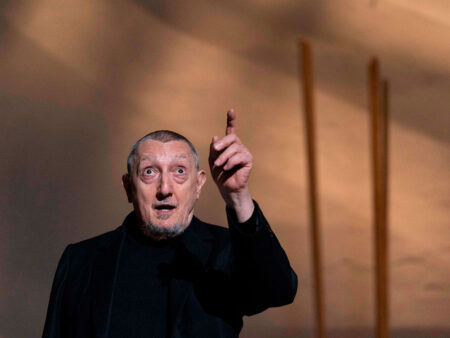
In che modo nel capolavoro di Paolo Uccello hai visto il nostro presente e il presente di questi attori e attrici?
Volevo che il lavoro avesse l’intensità di qualcosa come un innamoramento improvviso, qualcosa pieno di tensione, come la scena della Battaglia. Per me quelle dipinte sulle tavole sono forme, e quello che ho cercato di trattenere sulla scena sono proprio le forme, la loro organizzazione spaziale, la loro ragione. Ho amato la massa spropositata del culo dei cavalli, l’energia delle lance, il mistero delle armature, il puro movimento suscitato dalle linee. Sandro in scena cerca proprio di fare questo: tradurre nella scrittura e poi nella messa in scena le forme. In Prima vediamo cosa fa il regista-drammaturgo: come lavora sul quadro, che teatro fa, che teatro gli piace, in che modo scrive. Come spesso fanno i registi, sceglie un tema per parlare di altro, per portare in scena il complesso intrico di sentimenti che proviamo, forse per parlare della guerra in Ucraina attraverso l’ambientazione della battaglia. Tutto ciò riguarda il teatro in generale, o almeno il mio teatro, riguarda quanto noi teatranti siamo commossi e implicati in ciò diciamo in scena sul mondo e come quel mondo sia presente nei nostri corpi. E riguarda le conseguenze di questa commozione.
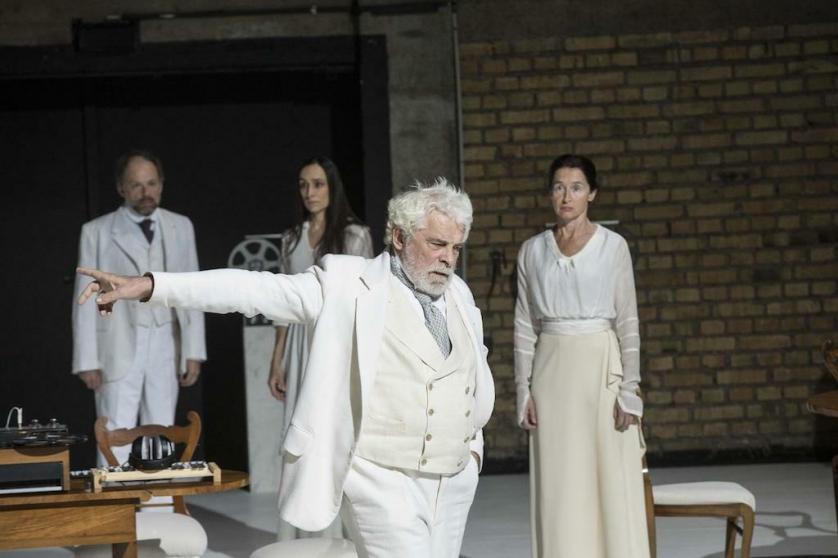
Pensando ai tuoi ultimi lavori visti in Italia, da 3 annonciations a Architecture, è chiaro che nel tuo lavoro gli altri linguaggi dell’arte informano la scena, il testo, la lingua del teatro. Spesso poi i tuoi attori e le tue attrici hanno una formazione e una riconoscibilità cinematografica…
In questa fase della mia vita mi piacerebbe fare un film, ma è sempre difficile trovare il momento per fermare le produzioni in giro per il mondo, che si susseguono a cascata con progetti articolati come questa trilogia. Ma non direi mai che il mio lavoro sia solo un lavoro di teatro, o di danza etc… Ha piuttosto sempre a che fare con l’associazione di segni: il mio lavoro è associare la parola con la luce, coi corpi, con la musica. Forse questa ibridazione ha a che fare con la mia formazione e la mia vita: sono nato a Nizza dove, sin quando ero giovanissimo, sono venuto a contatto con un ambiente in cui era molto presente la performance art. In generale credo che questo legame col posto in cui siamo nati sia fondamentale e misterioso. Penso ad uno degli artisti che amo di più, Romeo Castellucci. Si percepisce immediatamente nel suo lavoro un certo legame con la storia della bellezza, o meglio con quella storia dello sguardo che in Italia è profondissima, più che altrove (in qualche modo, sia pure declinata in maniera diversissima, ho trovato presente la stessa profondità visiva nella cultura giapponese). Penso che il legame particolare di ciascuna cultura con le forme sia unica e irriproducibile, e Prima mette in scena anche questo.
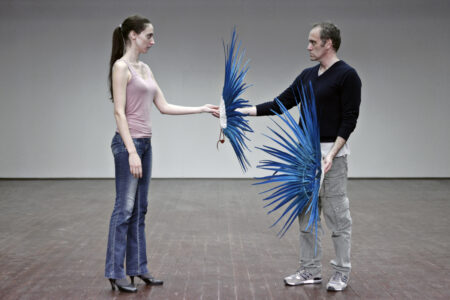
Eppure i tuoi lavori, profondamente inscritti nella langue, sono tradotti in più di trenta paesi. È un paradosso?
No, o comunque molto dipende dalla natura dei progetti. Penso ad esempio a Clôture de l’amour che in dodici anni è stato tradotto in quattordici lingue, o a Sorelle che abbiamo portato da poco in Burkina Faso, a Tallin, a Lima, a Madrid, e che presto andrà in scena a Hong Kong… D’altra parte non so se sia possibile portare Prima, ad esempio, in Germania o in Spagna, banalmente perché si tratta di una trilogia, ma anche per la complessità tecnica e artistica dell’allestimento, realizzato presso la Paolo Grassi, per la completa svestizione del palco del Piccolo che è stato interamente ridipinto di bianco, trasfigurato. È stato straordinario lavorare con gli artigiani, i tecnici, i costumisti. Tutta la produzione del Piccolo è eccezionale, posso dire che ho ritrovato un ambiente di lavoro a livello delle più grandi realtà mondiali.
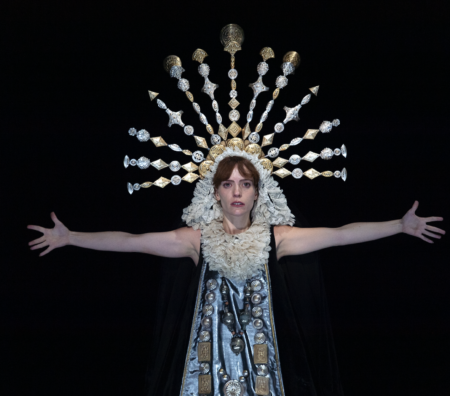
Oggi Milano rappresenta una sorta di unicum in Italia per disponibilità di risorse e vitalità del tessuto teatrale cittadino. Il Piccolo, senza dubbio, è l’esempio più virtuoso di questa fase storica. Tu stesso, d’altro canto, hai lavorato a lungo con istituzioni prestigiose con vaste capacità produttive. Ma credi che, paradossalmente, questa disponibilità di mezzi possa privarti, in qualche modo, della libertà creativa?
Sì, anche all’estero si avverte la crisi del teatro italiano. La risposta alla domanda è no. Posso dire di non avere mai lavorato per i soldi, è semplicemente il mio modo di vivere. Ho iniziato a fare teatro senza alcuna risorsa, e credo che se domani, di nuovo, non ci fossero più economie, mi basterebbe avere qualcuno con cui parlare e per cui scrivere, per fare teatro. Forse, anzi, questa condizione di essenzialità è qualcosa che ho cercato proprio nello svuotamento delle quinte in Prima, o nella pittura bianca, che è come cercare un grado 0 della rappresentazione.
A valle di più di quarant’anni di carriera, credi che oggi il potere del teatro di rappresentare il mondo sia in crisi?
Faccio teatro da quando ho 16 anni, oggi ne ho 60 e posso dire di aver lavorato ogni giorno di questi 44 anni, ma non so risponderti con un sì o con un no. In tutti questi anni però ho continuato a misurare quanto fare teatro, andare a teatro possa cambiare la propria percezione del mondo, ovunque nel mondo. Come ti dicevo prima, quando ho ricevuto la tua telefonata stavo lavorando su un testo che andrà in scena Al Cairo: Al Cairo, dove non si può parlare in pubblico di sesso, di dio o di politica in un certo modo (e prossimamente dovremmo inviare i testi in approvazione ad un organismo governativo di censura). Pensando ad altri paesi lontani dalla nostra idea della libertà, mi è venuto in mente l’incontro con un giovane regista a Pechino che, dopo aver visto un mio lavoro, mi disse “non ho mai visto un teatro fatto così”. Quando lavori in paesi senza libertà di parola capisci il potere del teatro, che è il potere della parola. Lo misuri anche nella paura politica che il teatro continua a generare.
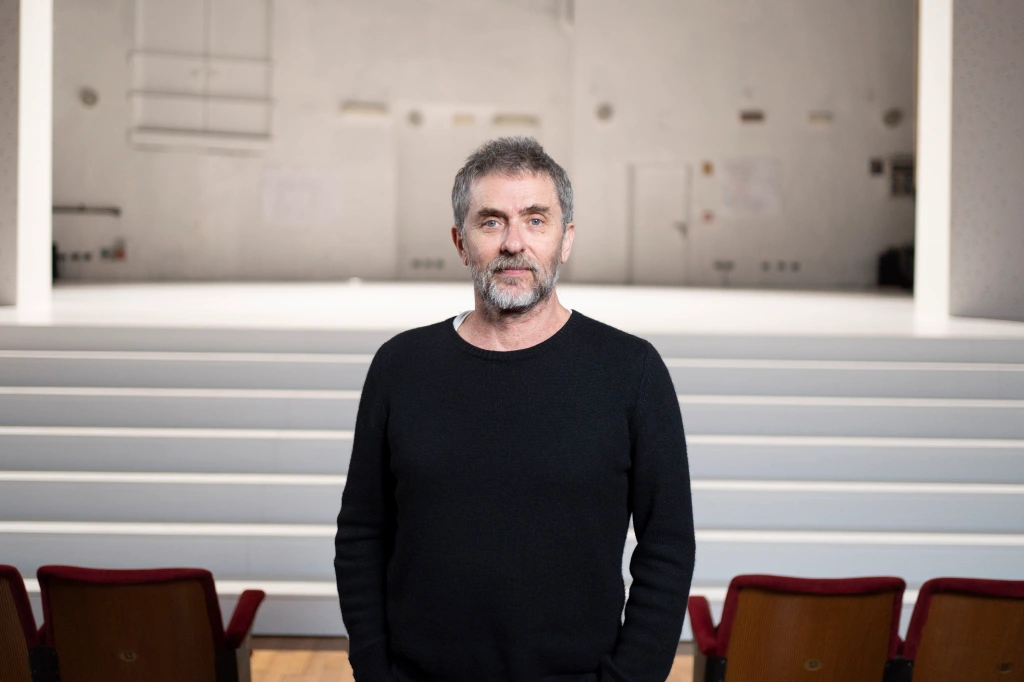
Senti una responsabilità, come regista e scrittore, rispetto a questo potere?
Sento una responsabilità nei confronti della lingua. Nei confronti del mestiere bellissimo, a volte noioso e privilegiato che faccio, e dei luoghi in cui lo faccio. Spesso penso che il mio ufficio mobile è Airbnb: con tutte le diverse città in cui viaggio lavoro sempre in un luogo e in una stanza diversi, e anche questa è una ricchezza e una complessità che mi impone responsabilità. Ma soprattutto la responsabilità è nei confronti della battuta che scrivo, del suo suono e della sua forma, che è politica. Questa presenza politica non è mai, però “frontale”: lo spettatore può intuire nel mio teatro un riferimento chiaro a certi scenari, alla guerra in Ucraina ad esempio, oppure no. Non scrivo mai pièce a soggetto: i miei lavori portano in scena, fondamentalmente, persone che parlano, che combattono tra di loro per la propria sopravvivenza, per il proprio amore. Soprattutto amo e osservo i momenti in cui la vita diventa troppo intensa, di un’intensità gioiosa o dolorosa.
Pensa a te stesso come spettatore\lettore. Cosa ti viene in mente?
Penso a quando ho visto per la prima volta l’Amleto della Societas Raffaello Sanzio nel 1992, in un festival in Francia. Poi mi viene in mente che in ogni paese dove mi trovo per lavoro, più che quando sono a casa a Parigi, mi piace andare al cinema in seconda serata e vedere film di giovani registi di quel paese. Come lettore amo leggere di filosofia (ho un percorso di studi in filosofia), in particolare testi di filosofia analitica americana. Mi aiuta a pulire la mente, a resettare il pensiero. E dopo dormo magnificamente.
Leggi anche la recensione su Cordelia di maggio 2023
English version
I reach Pascal Rambert on the phone just a few hour before the premiere of “Prima” at the Piccolo theater in Milan, while thinking that this jumble of words (in Italian, premiere is “prima”) is an overlapping that has a lot of the style of the French director and playwright. Always “au bord de la vie”, always as if about to fall from the stage and invade the audience, then from there, the world through the spectator’s consciousness. Rambert has a rested and youthful voice, and when I ask him how he is doing, thinking about the natural tension before a debut, he surprises me by answering, “I was working on the text of a new show that will debut in Cairo, at the D-Caf Festival, next October.” It’s as if in a few words all the ones that follow are intertwined, and the perception of speaking with an artist for whom theater reflects in the vastness of the world and vice versa, producing a clear, luminous, and at the same time, mysterious language like the perspective entanglement of the lances in the “Battle of San Romano,” the fifteenth-century triptych that inspires the Milanese show.
Rambert mentions many people’s names in our exchange, often repeating mine, just learned, as if to dig deeper into my listening. He dwells with particular gratitude on Pietro Valenti, who invited him to Italy in 2014 with “Clôture de l’amour,” a show that inaugurates a special relationship with Anna Della Rosa. “It’s particularly important for me to remember those people who first invited us to work in a country.” His words unfold clearly along two contrasting axialities: a centrifugal one of remote geographies, from Moscow to New York, from Beijing to Ouagadougou, and a centripetal one of loyalty to words, to actors, and actresses. “I try never to change production partners,” and even with Claudio Longhi, the idea of this trilogy has been well established since the first contact in 2020.
Why “The Battle of San Romano”? Why a painting?
Even in 3 annonciations, presented in Italy at the Triennale di Milano in 2021 with, among others, my friend Silvia Costa on stage, I started from a painting. In that case, the question that links the depth of the iconographic theme, the Annunciation, with our time is: what can be announced today? How can we write or rewrite, in 2023, starting from such an important theme in art history and, therefore, in our visual culture? For this trilogy at the Piccolo Theater in Milan, there was a short circuit between my fascination with “The Battle of San Romano,” its triptych nature, and Claudio Longhi’s proposal to articulate a work that covered three years with three shows: after hearing the request, it was immediately clear to me that the reference should be that one. So I spent several days observing the Florentine panel of the triptych, the Disarcionamento of Bernardino della Carda, and reading texts about it (the three panels of the painting are now divided and kept at the Uffizi Gallery in Florence, the National Gallery in London, and the Musée du Louvre in Paris).
But I am not an art historian, so the information that I learned, somehow, I immediately forgot when I started writing. However, first came the encounter with the actors: I never really start writing before meeting them, I always ask the production to let me hold auditions well in advance before starting the work. In this case, we formed the cast over a year ago, in January 2022. It went like this: on the first day of casting, I realized that I couldn’t not work with Anna Bonaiuto, the next day I had the same feeling with Marco Foschi. Right after, I realized that I absolutely wanted to bring to the stage some kind of relationship between the two. Then again the same desire when I met Leda Kreider, and from here came the idea of a man divided between two relationships. The choice of Anna Della Rosa was almost natural, I have worked with her in Italy for a long time. The meeting with Sandro Lombardi was just as inevitable. It reminded me of when, as a sixteen-year-old, I went to the Polverigi Festival and Velia Papa told me about this unmissable Florentine company, the Magazzini Criminali. Their path was very important in my training, so I thought Sandro could be, on stage, the director, the playwright. Here it is: a theater company that must stage a show about the Battle of San Romano. What happens before, during, and after? What are the causes and consequences, in terms of work, art, relationships, and politics, of the actions of the actors on stage?
Which connection do you find between our present, the present of these actors and actresses and Paolo Uccello’s masterpiece?
I wanted the work to have the intensity of something like a sudden love crush, something full of tension, like the scene of the Battle. For me, what is painted on the panels are forms, and what I tried to retain on stage are precisely the forms, their spatial organization, their reason. I loved the disproportionate mass of the horses’ butts, the energy of the lances, the mystery of the armor, the pure movement aroused by the lines. On stage, Sandro’s character tries to do just that: to translate the forms into writing and then into staging. In Prima, we see what the director-playwright does: how he works on the painting, what kind of theater he likes, how he writes. As directors often do, he chooses a theme to talk about something else, to bring to the stage the complex tangle of feelings we experience, perhaps to talk about the war in Ukraine through the setting of the battle. All of this concerns theater in general, or at least my theater, it concerns how moved and involved we as theater people are in what we say on stage about the world and how that world is present in our bodies. And it concerns the consequences of this emotion.
Thinking about your recent works seen in Italy, from 3 annonciations to Architecture, it’s clear that in your work, other art languages inform the scene, the text, the language of theater. Often your actors and actresses have a cinematic background and recognition…
At this stage of my life, I would like to make a film, but it’s always difficult to find the time to stop productions around the world that follow one after the other with complex projects like this trilogy. But I would never say that my work is just theater, or dance, etc… It rather has to do with the association of signs: my work is to associate words with light, with bodies, with music. Perhaps this hybridization has to do with my background and my life: I was born in Nice where, from a very young age, I came into contact with an environment where performance art was very present. In general, I believe that this connection with the place where we were born is fundamental and mysterious. I think of one of the artists I love the most, Romeo Castellucci. In his work, there is immediately a certain connection with the history of beauty, or rather with that history of the gaze that is very profound in Italy, more than elsewhere (in some way, even though it’s expressed in a very different way, I found the same visual depth in Japanese culture). I think that the particular connection of each culture with forms is unique and irreproducible, and Prima also stages this somehow.
However, your works, deeply rooted in language, are translated into more than thirty countries. Is it a paradox?
No, or at least it depends a lot on the nature of the projects. For example, I think of Clôture de l’amour which has been translated into fourteen languages, or Sorelle that we recently brought to Burkina Faso, Tallinn, Lima, Madrid, and soon it will be staged in Hong Kong… On the other hand, I don’t know if it’s possible to bring Prima, for example, to Germany or Spain, simply because it’s a trilogy, but also because of the technical and artistic complexity of the set design, made at the Paolo Grassi, with the complete stripping of the Piccolo stage that has been entirely repainted white, transformed. It was extraordinary to work with craftsmen, technicians, costume designers. The entire production of the Piccolo is exceptional, I can say that I have found a working environment at the level of the biggest world realities.
Today Milan represents a sort of unique case in Italy for the availability of resources and vitality of the city’s theater scene. The Piccolo is undoubtedly the most virtuous example of this historical phase. On the other hand, you have worked for a long time with prestigious institutions with vast production capacities. But do you think that, paradoxically, this availability of resources could somehow deprive you of creative freedom?
Yes, even abroad, the crisis of Italian theater is felt. The answer to the question is no. I can say that I have never worked for money, it is simply my way of life. I started doing theater without any resources, and I believe that if tomorrow, again, there were no economies, all I would need is someone to talk to and write for, to make theater. Perhaps, indeed, this condition of essentiality is something that I have sought precisely in the emptying of the stage in Prima, or in the white painting, which is like searching for a degree zero of representation.
After more than forty years of career, do you believe that today the power of theater to represent the world is in crisis?
I have been doing theater since I was 16 years old, today I am 60 and I can’t answer you with a yes or a no. But over all these years, I have continued to measure how doing theater, going to the theater can change one’s perception of the world, anywhere in the world. As I was telling you before, when I received your phone call, I was working on a text that will be performed in Cairo: in Cairo, where you cannot talk publicly about sex, God or politics in a certain way (and soon we will have to submit the texts for approval to a government censorship body). Thinking about other countries far from our idea of freedom, I thought of meeting a young director in Beijing who, after seeing one of my works, said to me “I have never seen theater like this.” When you work in countries without freedom of speech, you understand the power of theater, which is the power of speech. You also measure it in the political fear that theater continues to generate.
Do you feel a responsibility, as a director and writer, towards this power?
I feel a responsibility towards language. Towards the beautiful, sometimes boring and privileged profession that I do, and towards the places where I do it. I often think that my mobile office is Airbnb: with all the different cities I travel to, I always work in a different place and room, and even this is a richness and complexity that imposes responsibility on me. But above all, the responsibility is towards the line that I write, its sound and form, which is political. This political presence is never, however, “frontal”: the spectator can intuit in my theater a clear reference to certain scenarios, to the war in Ukraine, for example, or not. I never write plays with a subject: my works fundamentally bring people on stage who speak, who fight each other for their survival, for their love. Above all, I love and observe the moments when life becomes too intense, of a joyful or painful intensity.
Think of yourself as a spectator/reader. What comes to your mind?
I think of when I first saw the Societas Raffaello Sanzio’s production of Hamlet in 1992, at a festival in France. I think about how in every country where I am for work, more than when I am at home in Paris, I like to go to the cinema late at night and watch films by young directors from that country. As a reader, I love to read philosophy (I have a background in philosophy), especially texts of American analytic philosophy. It helps me clear my mind, reset my thinking. And then I sleep wonderfully.
Andrea Zangari
Fino al 28 maggio 2023 al Piccolo Teatro Grassi, Milano
testo e regia Pascal Rambert
traduzione Chiara Elefante



